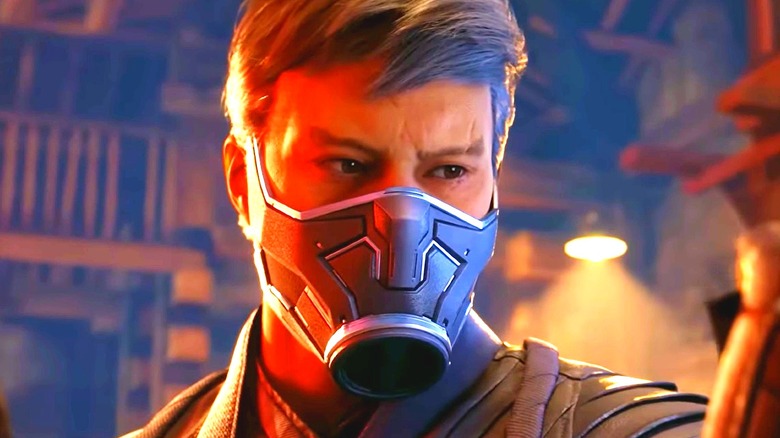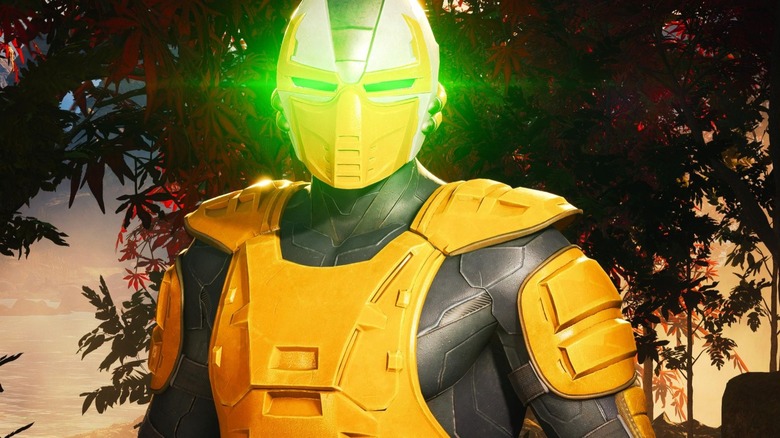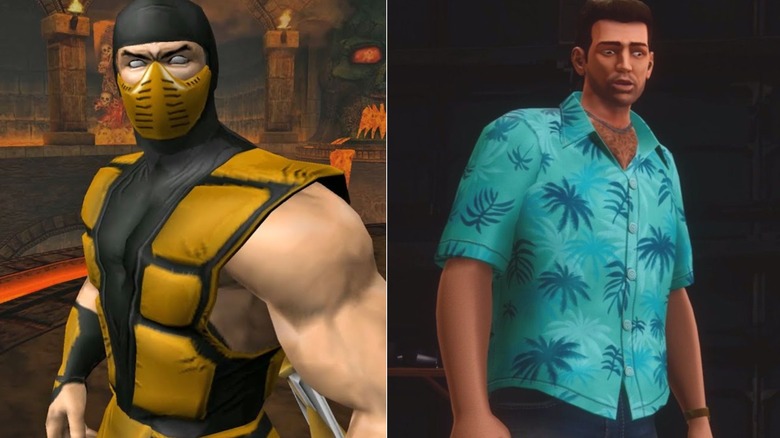4 Horrible Crimes That Were Blamed On Mortal Kombat
The following article includes incidents of child abuse and gun violence.
"Mortal Kombat" stands as one of the more controversial franchises in gaming history. The series' marketing is often built around its wild levels of violence and the incredibly brutal finishing moves — or Fatalities — that can be performed with a bit of practice. With that in mind, it's no surprise that politicians and parents' groups have taken issue with the games. However, sometimes the concern goes beyond making sure that kids don't accidentally play one of these games before they're old enough to handle its brand of fantasy violence.
Whenever debates arise about video games and their possible connections to real acts of violence, "Mortal Kombat" is typically a part of the conversation. The original game was one of the main inspirations for the creation of the Entertainment Software Rating Board, which regulates the accessibility of adult content in video games through a rating system. In the years since, some criminals have pointed to "Mortal Kombat" as their inspiration, only to later recant their claims. Others have stuck to their stories, blaming violent video games for their actions. Other times, "Mortal Kombat" has been used as a scapegoat when condemning heinous acts. In all cases, the debate over violence in video games was ignited once again. Here are some terrible crimes that have been blamed on "Mortal Kombat."
Midway sued over alleged Cyrax-inspired killing
13-year-old Noah Wilson was murdered in 1997 when his friend, Yancy Salazar, stabbed him in the chest with a kitchen knife. According to a lawsuit filed by the victim's mother, Andrea Wilson, Salazar had been inspired to do this after becoming obsessed with the "Mortal Kombat" series. In particular, she claimed that Salazar had convinced himself that he was the android character Cyrax. Court documents state that Cyrax "kills his opponents by grabbing them around the neck in a 'headlock' and stabbing them in the chest."
After her son's murder, Wilson filed a suit against Midway Games, the original developer and publisher of the "MK" franchise, seeking damages and demanding that the company put stronger warnings on its games. Furthermore, according to a report from the New Haven Register, Wilson also sued business owners Savvas and Athanasia Ioannidis for allegedly allowing the young boys to play a "Mortal Kombat" arcade cabinet in their restaurant.
The trial did not go in Wilson's favor, however. Not only does Cyrax not perform a move such as the one described in her suit, but the Ioannidises denied having the game in their establishment. Though the judge acknowledged that Wilson made several succinct arguments against Midway, the case was ultimately dismissed.
The 'Mortal Combat' murder of Zoe Garcia
In 2007, Lamar Roberts and Heather Trujillo were arrested for the murder of Trujillo's half-sister, seven-year-old Zoe Garcia. While babysitting the young girl, Trujillo and Roberts began beating and slamming her to the floor. At the time, Roberts and Trujillo claimed to have been wrestling with this Garcia, playing a rough-housing game they called "Mortal Kombat" (referred to in some incident reports as "Mortal Combat"). According to court documents, when asked why he didn't stop when Garcia told him she was hurt, Roberts replied, "I don't know, I was drunk."
Speaking to the Greeley Tribune in the aftermath of the killing, Heather Trujillo's aunt and stepmother remained unconvinced of the "Mortal Kombat" claims. According to them, they'd never seen Trujillo behave in a violent manner, and they believed that Roberts had instead fabricated this part of the story. Both Roberts and Trujillo would eventually plead guilty; Roberts was sentenced to 36 years in prison and Trujillo was sentenced to 18 years.
If you or someone you know may be the victim of child abuse, please contact the Childhelp National Child Abuse Hotline at 1-800-4-A-Child (1-800-422-4453) or contact their live chat services.
Mortal Kombat and GTA blamed in tragic shooting
In early 2007, Patrick Morris was charged with the murder of 15-year-old Diego Aguilar. Following a scuffle involving multiple parties over the sale of a counterfeit ring, Morris fired upon the victim five times with a shotgun. Aguilar was an innocent bystander during the conflict, and his murder allegedly shocked the rest of the group with Morris, some of whom claimed they did not know about his weapon.
Morris' lawyer argued that his client had been influenced by violent video games, specifically citing "Mortal Kombat" and "Grand Theft Auto" as contributing factors in the case. Speaking with the Associated Press (per GamePolitics), defense attorney Robert Abel said that video games "may have blurred Morris' ability to distinguish reality and the consequences of his actions." As the trial commenced, Abel argued that Morris' use of psilocybin mushrooms further blurred these lines, and that his client was not in his right mind when he committed the murder.
Charleston shooting called 'Mortal Kombat murders'
On June 17, 2015, 21-year-old Dylann Roof walked into Emanuel African Methodist Episcopal Church in Charleston, South Carolina, where he opened fire and took the lives of nine people. Roof's crimes were largely racially-motivated, as proven by a manifesto posted online that touted his white supremacist and neo-Nazi views. Roof was eventually sentenced to nine consecutive life sentences without any possibility of parole. Despite being very clear in his intention and motivations behind this horrible attack, however, CNN's Ashleigh Banfield publicly drew a connection between the shooting and "Mortal Kombat."
In a controversial clip, the subject of white supremacy came up as Banfield debated with Congressman Ben Jones over the history of the Confederate flag. Referencing Dylann Roof's vicious attack, Banfield argued, "White supremacy ... just, not even a week ago, led to the Mortal Kombat murders of nine innocent churchgoers." It's possible that the callout of "Mortal Kombat" was due to a mixup, but it drew the ire of fans, many of whom pointed out that there are few (if any) lines to be drawn between the fighting franchise and the mass shooting.
If you have been impacted by incidents of mass violence, or are experiencing emotional distress related to incidents of mass violence, you can call or text Disaster Distress Helpline at 1-800-985-5990 for support.



